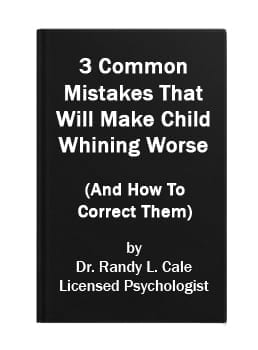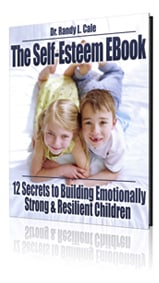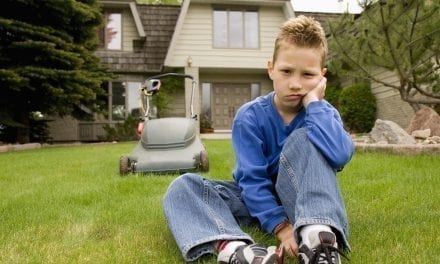The Whining, Complaining Bored Child
 Have you noticed that most parenting experts have nothing to say about whiners and complainers? It all sounds like the same stuff you’ve heard before, and you notice it doesn’t really address the problem. Plus, it just gets worse.
Have you noticed that most parenting experts have nothing to say about whiners and complainers? It all sounds like the same stuff you’ve heard before, and you notice it doesn’t really address the problem. Plus, it just gets worse.
Help for the Whiner: So, here’s a real approach. It’s been tested, and it works! I have used this with hundreds of families where their child was whining and complaining. The same strategy works with the child who just seems to be constantly focusing on the negative.
Over the years, I’ve heard dozens of stories of children returning to the hotel after a day at Disney World, and then complaining to Mom or Dad that they are bored. Or perhaps, they begin to whine because they didn’t get what they wanted for dinner, or because they didn’t get an extra ride on their favorite.
The Core Problem: Finding A Way To See Lack, When There Is Plenty!
 Many of the children who come to my practice live in relative affluence, with access to a wide variety of toys, activities, and stimulation. They have loving parents who care about them, and yet they whine and complain constantly. The solution for these negatively focused children is not antidepressants; it’s paying attention to how parents are unknowingly nurturing and shaping their negative, complaining attitude.
Many of the children who come to my practice live in relative affluence, with access to a wide variety of toys, activities, and stimulation. They have loving parents who care about them, and yet they whine and complain constantly. The solution for these negatively focused children is not antidepressants; it’s paying attention to how parents are unknowingly nurturing and shaping their negative, complaining attitude.
All children whine and complain at times, but some children spend an inordinate amount of time complaining about their lives, looking at what’s not right rather than appreciating all that’s available to them. Unfortunately, many adults do the same thing. If you sit at the dinner table complaining about what’s wrong in your life, your children will learn from your example.
You really want to pay attention to this first and foremost. Why?
Because you can’t escape what you model for your kids. If you model that you notice what’s wrong (when there is so much other stuff to focus on), then your kids MUST GET IT. You are teaching them to focus on what’s not working. In essence, you may be the complainer who is teaching them what to focus on.
Is this always the case? NO! But be cautious, as there is nothing you can do as a parent to escape the impact of what you model.
When Children Whine And Complain…
When children whine and complain, it’s understandable to get a bit frustrated. We all get frustrated when toddlers and children don’t listen.
We ask them not to whine. Yet, there they are whining.
We ask again calmly…and yet…there’s that darn whining.
We explain that we won’t listen to them perhaps, if they keep whining. And yet, more whining.
What’s the deal? Why don’t they understand that we just want them to use their normal voice…just like they do at school.
Well, first…let’s consider the complaining and whining child. This is not just a way of speaking, this is a way of viewing the world. Often, the child sees a world that sounds like this:
- It’s not fair.
- I wanted chocolate, not vanilla.
- I can’t. I can’t.
- Why do I have to do it?
- It’s his fault. Not mine.
- I didn’t do it.
- Why can’t I ever get what I want?
For this combination of whining and complaining, most of us see our children as having an unusual perspective. They are beginning to take a somewhat ‘poor me’ perspective, when this doesn’t line up with reality. We know that often they do get their way. We know that they can usually do it. We even see them do something, and yet they deny that it’s their fault.
This negative view of the world if often expressed in a whining voice.
This combo is quite exhausting and frustrating. Once they begin to complain and whine about themselves, we (often…not always) fall into a trap. The trap is that we start to try to pull them out of it.
When we start to see our children viewing the world in such a negative way, we start to try to help them…to pull them out of it…and to encourage them to view things differently. The harder we work at this…the more they seem to whine and complain.
If not careful, this is the foundation for a very poor outlook on life, and such negative perspectives form the core of a more saddened outlook on life.
Click Here: Next, why this behavior gets stronger…not weaker with time.
Parents may lecture them on how lucky they are and how grateful and appreciative they should feel. These lectures are repeated over and over. The kids roll their eyes. Parents may get frustrated and yell at the kids to stop complaining or send them to their rooms when they start whining. Does this work? Of course not. Words don’t teach children to stop whining and complaining.
If You Engage A Behavior, It Will Grow. This Is The Law.
If you allow yourself to be pulled into their whining and complaining, it will increase. In other words, if you get pulled into arguing, reminding, reprimanding, correcting or lecturing, you are engaging the very behavior you want to reduce. This approach won’t work. In fact, it can’t work. The whining and complaining MUST GET WORSE!
So, it’s time to take another approach. You can turn things around faster than you think. Within weeks most of this whining and complaining can be history.
As I walk you through this, keep in mind that the strategies for dealing with whining and complaining is covered thoroughly in the Wipe Out the Whining audio program. This is a program that walks you through a very specific plan with a proven success record. You can be free of whining and complaining. More importantly, your kids can learn to focus their attention and their mental energy on the positive, rather than complaining and whining. But first, let me give you a sense of what this is about.
Try the following approach. It’s the basis behind the powerful and successful Wipe Out the Whining program.
Wipe Out The Whining: The Basic Plan
1. Tell The Kids A Change Is Coming.
Alert them to the fact that:
“Mom and dad have made a mistake. We have been responding to you when you act younger than your age. We have responded when you whine. We have responded when you complain. We have responded to you saying you are bored. That’s going to change.”
2. Stop Paying Attention To Whining And Complaining.
 Walk away from the complainer and allow the whining to drone on and on. Don’t respond to any form of whining or complaining, for any reason. Be steadfast in your resolve to put your attention elsewhere.
Walk away from the complainer and allow the whining to drone on and on. Don’t respond to any form of whining or complaining, for any reason. Be steadfast in your resolve to put your attention elsewhere.
When your child says they’re bored, it would be okay to remind them once that it’s their job to find something to entertain themselves…it’s not your job. Note that you can say this because it’s very likely you spend an inordinate amount of time and energy making sure the kids have things to do. Once in a while, they NEED to learn how to entertain themselves. Regardless, the “I’m bored” gets no response from you. Got it?
Now stick to it.
3. Ignore Any Requests That Stem From Complaining Or Whining.
When children are whining, it’s frequently because they want something different than what they’re getting. They want you to change your mind, or they want to do something they can’t do at this moment, or they want something they can’t have. Make sure they don’t get what they want. It’s as simple as that. Make sure they don’t get whatever they’re making a fuss about, because if they get it, they’ll learn that this behavior pattern works.
When you first start ignoring them, the whining and complaining will probably get worse. Stick with it for a week or two, and you’ll be rewarded: The behavior will start to disappear. As soon as your children stop complaining, quickly reengage with them, without lecture or reminder. Pay attention to them any time they’re not complaining and whining. You can tell them in advance that you’re going to do this, but once you implement this approach it’s not necessary to remind them. Let your actions – not your words – do the teaching.
That’s the basics and it will change things in your home. Try it and see. It will make a powerful difference because there’s more going on here than it appears.
However, you may still have questions… like….
- What do you do instead of reacting?
- What do you teach instead?
- How do you coach your kids into using more effective strategies to get what they want?
- How can they learn to be more positive?
- What can you do to teach them to handle their negative, painful moments?
The answers to these questions and more are provided on the Wipe Out The Whining audio program. You can order the CD, or download the program NOW! You can almost instantly have access to this powerful program. Want to learn more? – Click here.

 ** Please double check for accuracy. Your privacy is SAFE. We will NEVER sell/rent/give away your information.
** Please double check for accuracy. Your privacy is SAFE. We will NEVER sell/rent/give away your information.














